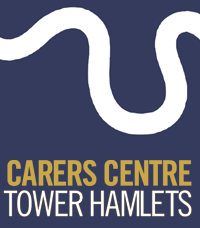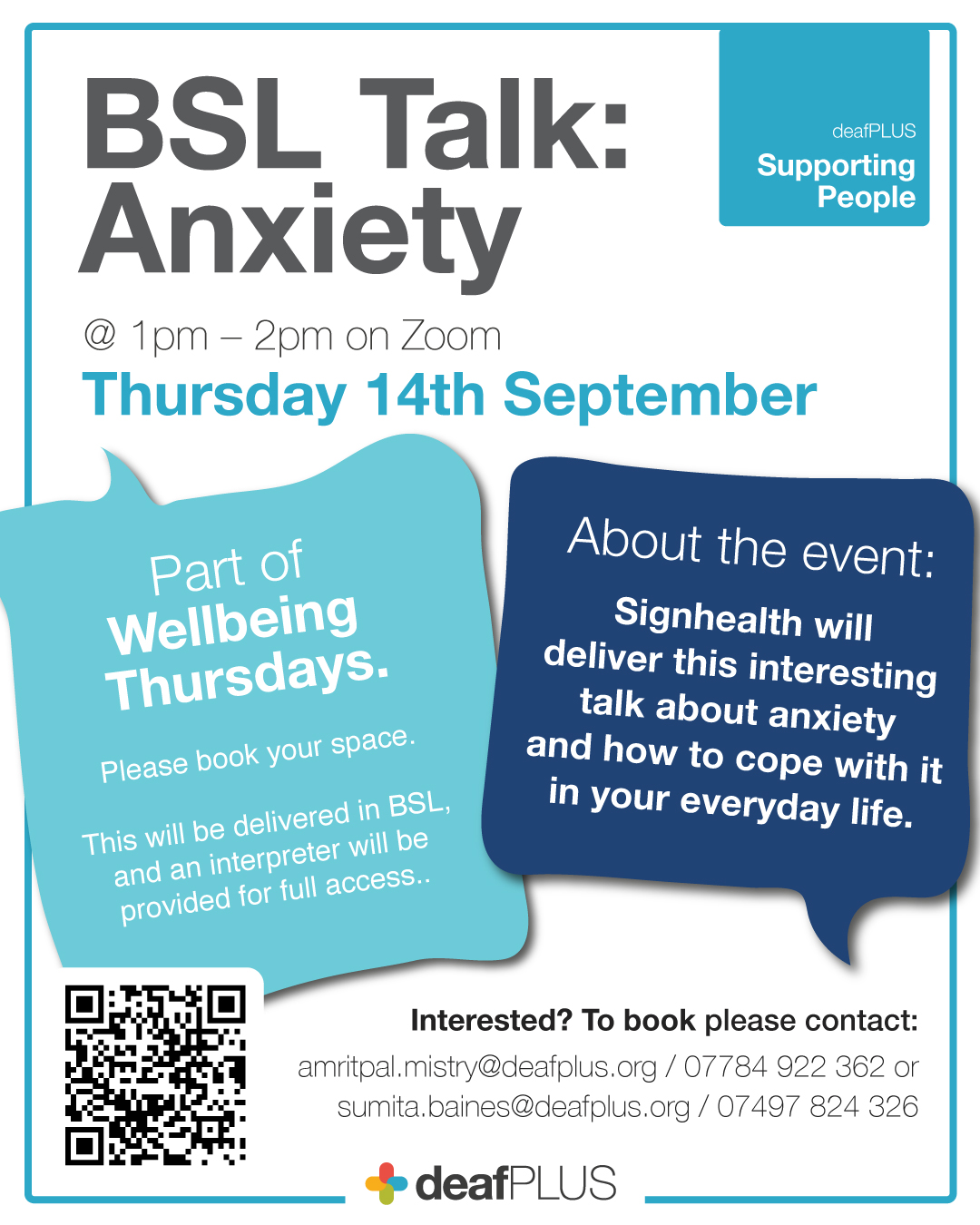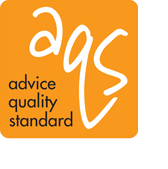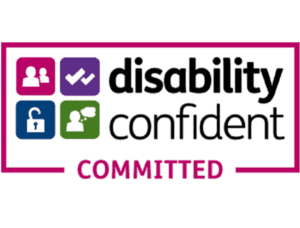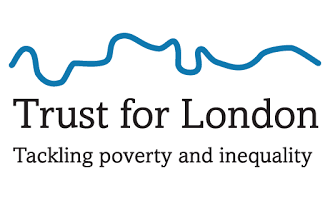Hello Everyone – Respite is Key
This blog is coming to you today early as I finish today and go on a much needed longish holiday and I will see or you will hear from me at the end of the month.
I realised this week that I had not been on holiday or have a restful break this year. My first planned break end abruptly with the passing of my Dad and the one I planned for my birthday coincided with me getting Covid. So, fingers crossed this one is restful, fun and peaceful.
I am off to a wedding tonight and I cannot think of a better way to kick off my holiday. This, got me thinking that as carers we need respite either from statutory services, friends and family taking over the caring role for a week here and there so, that you can have a break. Where possible negotiate with family for them to take over sometimes or make a request from the local authority via your Carers Needs Assessment or the Needs Assessment of your loved ones.
Local councils will only fund respite care for people that they have assessed as needing it. So if you want the council to pay for respite care for either yourself as a carer or the person you look after, it’s important that you both have an assessment. Carer’s should have a carer’s assessment.
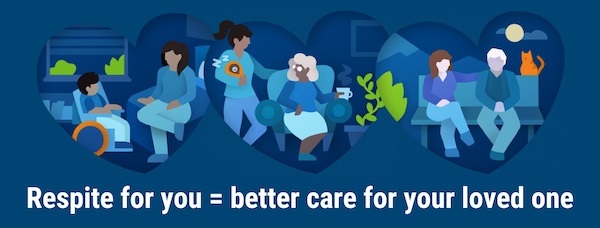
I am on leave so please remember to sign in, sign activity list
Peer support group for carers of someone with Autism, Learning Disability, Physical Disability and/or behaviours that challenge – 13th September @ 11am to 1pm
As I am on leave the group will be in person only and the topic: How can the Carers Centre Support Carers when dealing with Community Learning Disability Service.
I understand that some carers have had a few issues and we thought it would be good for carers to discuss and write down and how we can help, support and inform.
Disclaimer: The author is writing his personal thoughts on behalf of the Carers Centre Tower Hamlets and assumes no responsibility or liability for any errors or omissions in the content of this blog. The information and thoughts contained in this blog is provided on an “as is” basis with no guarantees of completeness, accuracy, usefulness or timeliness but is the intellectual property of the Carers Centre Tower Hamlets.![]()

Position Overview:
As a Welfare Benefits Advisor for Unpaid Carers, you will be a pivotal advocate for individuals who provide care without financial compensation. Your role will involve providing personalised guidance on available benefits and entitlements, aiding in benefit applications, and offering emotional support to unpaid carers. By empowering them with crucial resources, you’ll play a pivotal role in improving their well-being and quality of life.

Level 3 Hot Weather Alert
Heatwave action, temperature reached in one or more Met Office National Severe Weather Warning Service regions.
AMBER Heat-Health Alert – (Enhanced hot weather response) has been updated for the following regions: North West, Yorkshire and The Humber, East Midlands, West Midlands, East of England, London, South East, South West and is in effect between 05/09/2023 at 12:00 and 10/09/2023 at 21:00.
Hot weather can cause people to become unwell through dehydration, heat exhaustion and heatstroke and can increase the risk of heart attack, stroke, lung problems and other diseases.
You can reduce the risks associated with hot weather for those you care for by:
- having a plan in place for individuals you are responsible for to keep them and the home cool
- ensuring all social care staff are familiar with this guidance and your local plans before 1 June each year
- knowing who is at higher risk of heat-related illnesses and how to reduce that risk
- considering environmental changes that could reduce exposure to heat
- ensuring those you care for drink plenty of fluids throughout the day and monitor for signs of dehydration
- planning activities for times of the day when it is cooler such as the morning or evening
- keeping those you care for out of the sun at the hottest time of the day between 11am and 3pm
Who is at risk
Older people and those with underlying medical conditions are particularly vulnerable to the effects of hot weather. This means that people living in care homes, those who are unable to care for themselves or those who require support in their daily activities are at higher risk of becoming unwell from hot weather.
There are certain factors that increase a person’s risk during hot weather. These include:
- age: older individuals, especially those over 65 years old (note change from previous guidance of 75 years of age and above), as well as babies and young children
- those living on their own, those who are socially isolated, those who are unable to look after themselves and those living in a care home
- medical conditions that reduce the body’s ability to adapt to heat, including cardiovascular, kidney and respiratory conditions, diabetes, peripheral vascular disease, Parkinson’s disease, obesity, or severe mental illness
- medications that potentially affect heart or kidney function, cognition, or ability to sweat
- any limitations to ability to adapt behaviour to keep cool, for example: cognitive impairment like dementia, restricted mobility, the use of alcohol or recreational drugs
- environmental factors such as living in a top floor flat, experiencing homelessness, physical activity that is outdoors or in hot places
- air pollution as this can become worse during hot weather and can cause problems for people with asthma and other breathing problems
How to recognise heat exhaustion and heatstroke
Heat exhaustion occurs when the body overheats and can’t cool down. Heat exhaustion does not usually need emergency medical attention if the person cools down within 30 minutes.
Common symptoms of heat exhaustion include:
- tiredness
- weakness
- feeling faint
- headache
- muscle cramps
- feeling or being sick
- heavy sweating
- intense thirst
If action is not taken to help the person to cool down, heat exhaustion can lead to heatstroke.
Heatstroke is where the body is no longer able to cool down and the body temperature becomes dangerously high.
Common symptoms of heatstroke include:
- confusion
- lack of coordination
- low blood pressure
- fast heartbeat
- fast breathing or shortness of breath.
In addition, skin may stop sweating and someone may have seizures (fits) or collapse.
Heatstroke is a medical emergency. If you are concerned or think someone has heatstroke you should dial 999.
What to do if someone has symptoms of heat exhaustion
How to cool someone down if they have symptoms of heat exhaustion:
1. Move them to a cooler place such as a room with air conditioning or somewhere in the shade.
2. Remove all unnecessary clothing like a jacket or socks.
3. Help them drink a sports or rehydration drink or cool water.
4. Apply cool water by spray or sponge to exposed skin; cold packs wrapped in a cloth and put under the armpits or on the neck can also help.
They should start to cool down and feel better within 30 minutes.
If you are concerned about symptoms, or they are worsening, seek medical advice by contacting NHS 111. In an emergency, or if you think someone has heatstroke, dial 999.
Further information on heat exhaustion and heatstroke symptoms can be found on NHS.UK
The Next Two Week’s Activities – check out https://ccth.org.uk/calendar/
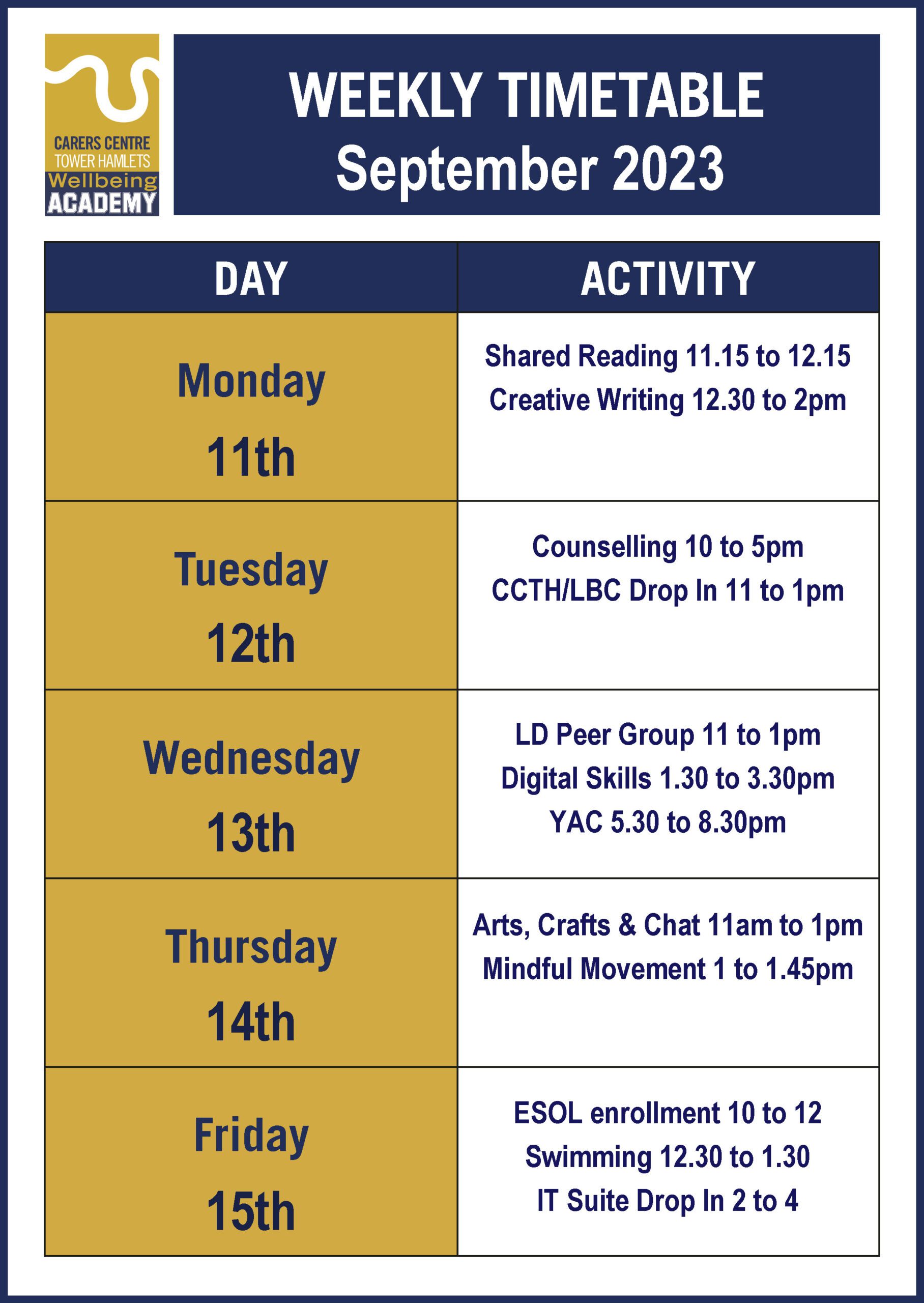
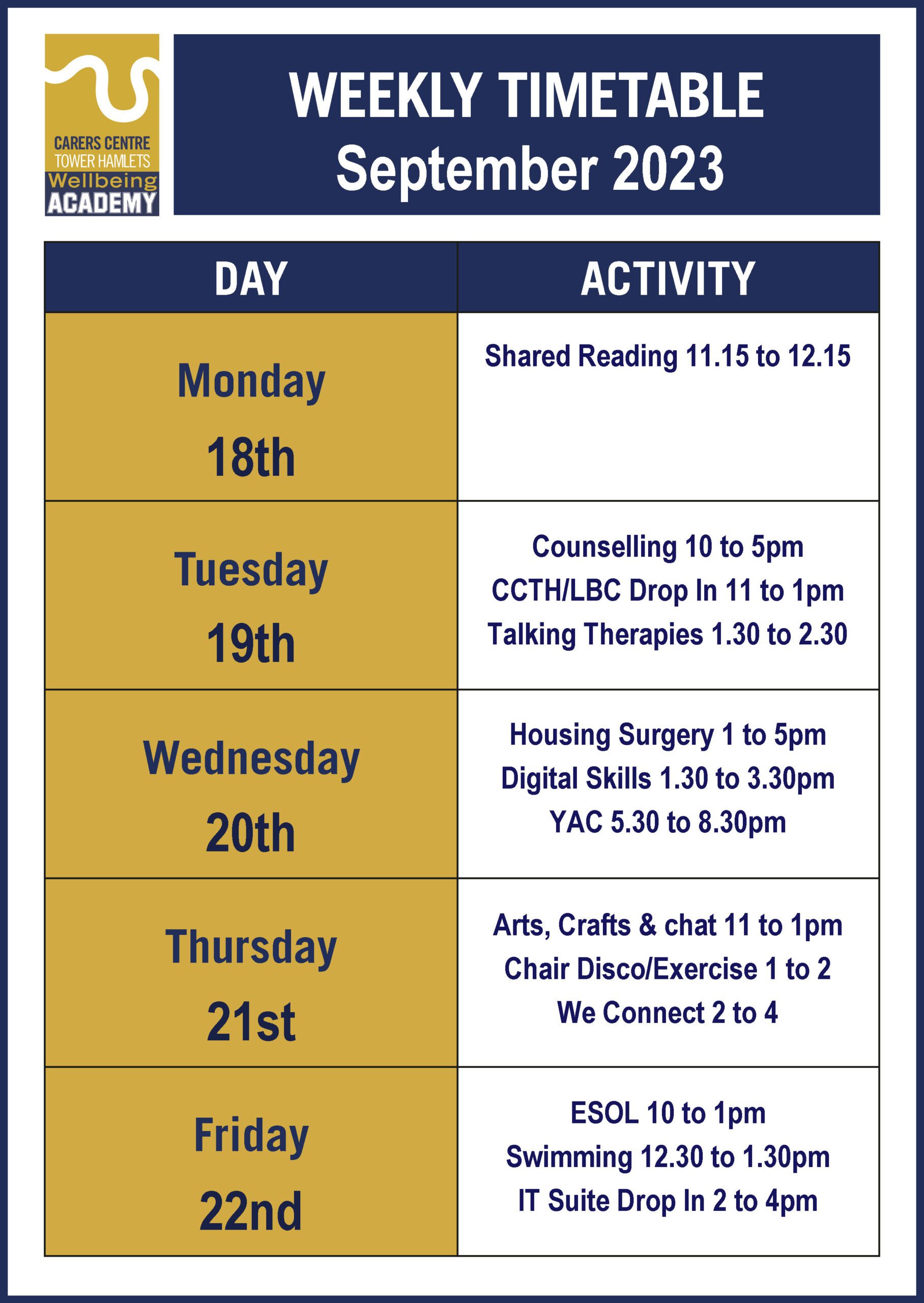

Join Tom Fortes Mayer to learn what real happiness is and how you can get more of it by finding your peace, power and purpose.
| Book Your Place |
Don’t forget – Talking Therapies Self-Compassion Workshop Tuesday 19th September @1.30pm to 2.30pm at The Carers Centre
This workshop by Tower Hamlets Talking Therapies introduces self-compassion, how it can support carer mental health and engaging exercises to build self-compassion. We’ll also reflect as group on our own experiences of compassion and self-compassion and how they impact life as a carer.
Self-compassion can support carers in reducing stress, increasing distress tolerance, and increasing problem solving skills. It can support carers relationships with others and increase emotional well-being.
New Activities – September 2023
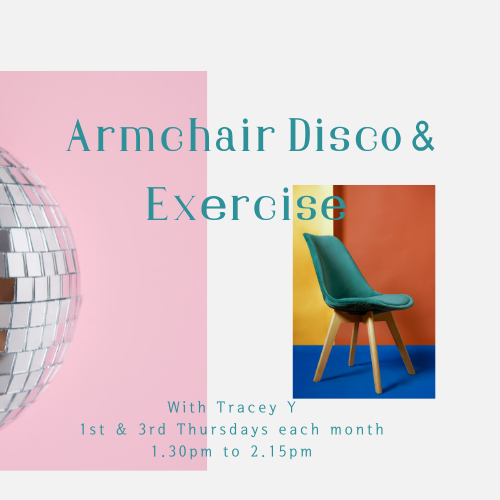
Chair Disco & Exercise
Thursday’s next session is today 7th and 21st September @ 1.30pm to 2.15pm
This new activity is part of our volunteer/accredited Carer Health Champions programme and Tracey will be facilitating two sessions a month where you will have the opportunity to sit or stand and do an exercise and disco session, learn to use your body, stretch, raise your heartbeat, and have some disco fun.
This weeks session went very well and many carers came and enjoyed themselves as well as helping to improve their physical and emotional wellbeing. I hope to see more of you and a big thank you to the wonderful Tracey.
Creative Writing for Carers
Monday’s 11th & 25th September @ 12.30pm to 2pm
We are introducing a twice monthly creative writing group led by another carer champion the wonderful Anita. You will have the opportunity to remain in a creative bubble as these sessions are directly after our Shared Reading Group. Think how you are transported to another world with the reading group and how you can use your imagination to write your own short story, poem and use this time for yourself to think about you.
Ramble for better Health
Unfortunately there is no Ramble for Better Health in September as the facilitator/carer is doing caring role tasks i.e. cared for hospital appointments and have a respite break – you can join again in October
This activity is facilitated by Sharron one of our volunteer/accredited Carer Health Champions and this activity is for carers who wish to get healthier, maintain good health, reduce the risk of Diabetes, heart disease and high blood pressure and have fun trying.
Good Vibe Afternoon & Picnic – @ The Docklands Museum (New Exhibition)
Thursday 28th September @ 1pm to 4pm
This new Carer Champion activity facilitated by Hilary is where carers will be able to attend a local, free, or low-cost day trip, bring a picnic and Watch out for news of each month’s trip.
Mindful Movement
Thursday 14th September at 1pm to 1.45pm
This gentle but effective activity helps you relax, use your body with gentle exercise as it is similar to Qigong. Carers will have the opportunity to come try out a new monthly exercise group and you can even do this sitting down.
Don’t forget that the activities we run are aimed at giving carers a chance for emotional respite, enabling connection with others so you do not feel alone and giving carers the chance to have fun, relax and be in the moment.
#
Don’t miss Victoria Bark dog show
The popular Victoria Bark dog show returns on Sunday 10 September, 11am to 4pm. Located in Victoria Park, Gore Gate, the show is £5 per entry with stalls for dogs and their owners.
We’ve organised the dog show in partnership with charity All Dogs Matter. All proceeds are used to support the charity’s rescue dogs.
Find out more >
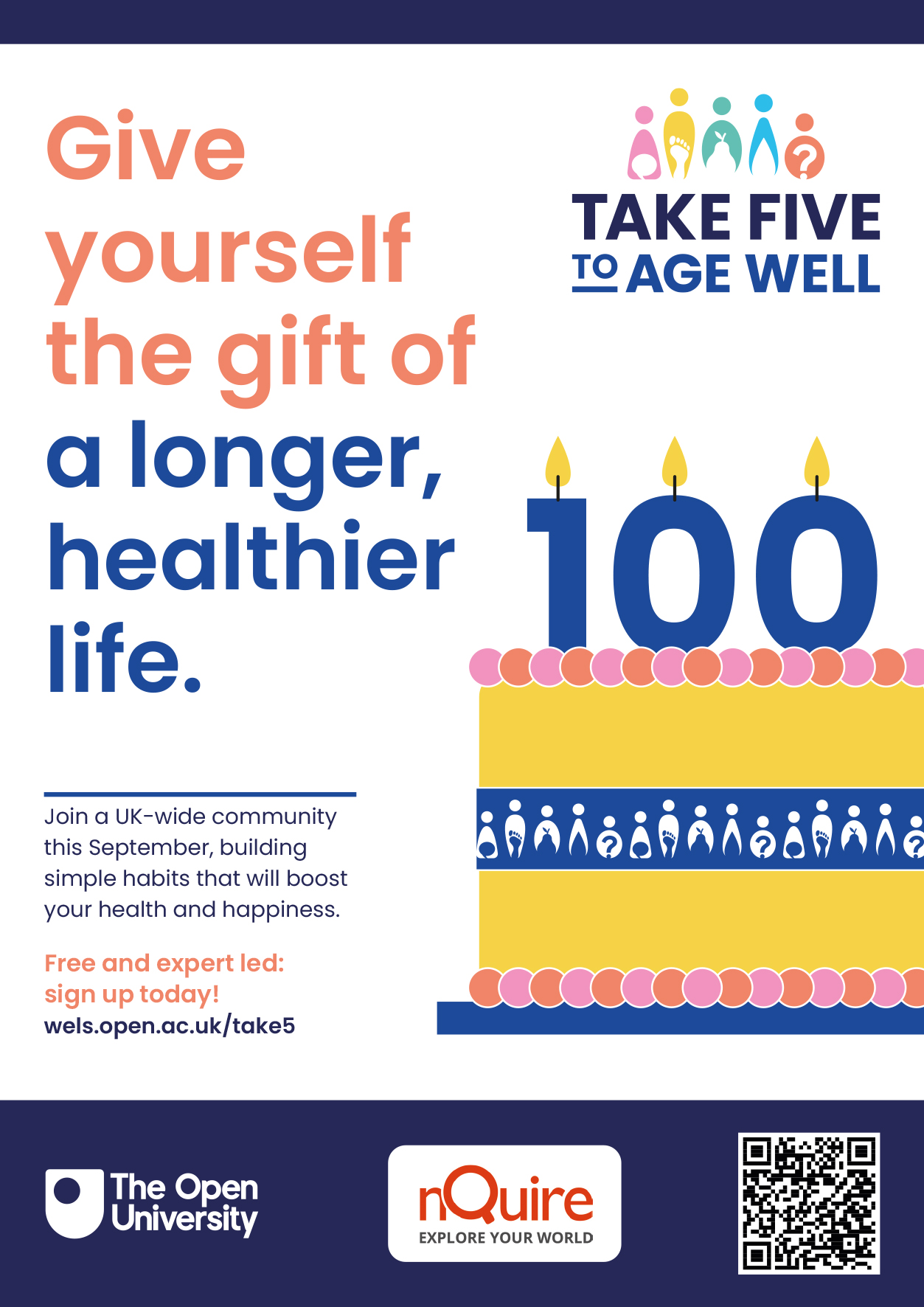
The Open University announces new national health campaign empowering the UK to Age Well
- The Open University is launching a new UK-wide month-long pledge aimed at people over 50 called – Take Five to Age Well.
- Launching on 1 September, the Take Five to Age Well pledge will build a UK-wide movement of people committed to ageing well behaviours, with a lasting impact on their health and wellbeing.
- TV presenter Kaye Adams, leading healthcare expert Sir Muir Gray, and leading expert on ageing Professor Rose Anne Kenny are all supporting Take Five to Age Well, alongside parts of the NHS.
- By taking part in the pledge people will sign up to a month of healthy habits shaped by leading experts from The Open University that will boost their health and well-being.
- Research shows that 70-80% of your ageing rate is largely determined by environmental factors (non-genetic) and many of these are within our gift; by making small changes in lifestyle we can live longer, healthier lives.
Similar to the tried and tested Dry January and Stoptober models, The Open University’s Take Five to Age Well campaign is encouraging people over 50 to sign up to a month of healthy habits designed by experts from the University.
With an ever-increasing demand on adult social care services and the NHS across the UK, The Open University will help people take proactive care across the month of September in five key areas of their lives.
Take Five to Age Well builds upon the Five Pillars of Ageing Well, devised by Dr. Jitka Vseteckova and is one of The Open University’s Open Societal Challenges which looks to use the power of the University’s research to address complex issues affecting society.
Top tips from Take Five to Age Well include:
- Stand on one leg whilst brushing your teeth – this is great for balance that become more and more important to avoid falls.
- Drink a glass of water before every snack and meal – this will help you stay hydrated (our hirst response weakens with age due to cognitive changes and so you need to proactively drink water even if you don’t feel thirsty).
- Choose a new vegetable you wouldn’t normally buy from the supermarket and look up a recipe that uses it.
- Spend 5 minutes doing something creative: draw a picture, play an instrument, do an origami online tutorial.
- Offer to walk someone’s dog – spending time with animals is calming and walking in nature is good for the body and brain.
- Laugh and have fun – the dose of dopamine from laughing stimulates the synthesis of new proteins in the brain, it also reduces stress and boosts mood. The average four year old laughs 300 times a day, whereas the average 40 year old laughs only four times.
The Carers Centre is a partner of this project and has helped develop it.

Come along to a free clothes and book swap
Clear out your wardrobe and join us, SunnyJar Eco Hub and Friends of the Earth Hackney for a free clothes and book swap.
There will also be a mending and patching workshop where you can bring your clothing to be mended. The event will take place at St Margaret’s House, 21 Old Ford Road, E2 9PL on 16 September from 10.30am to 1.30pm.
Get swapping >
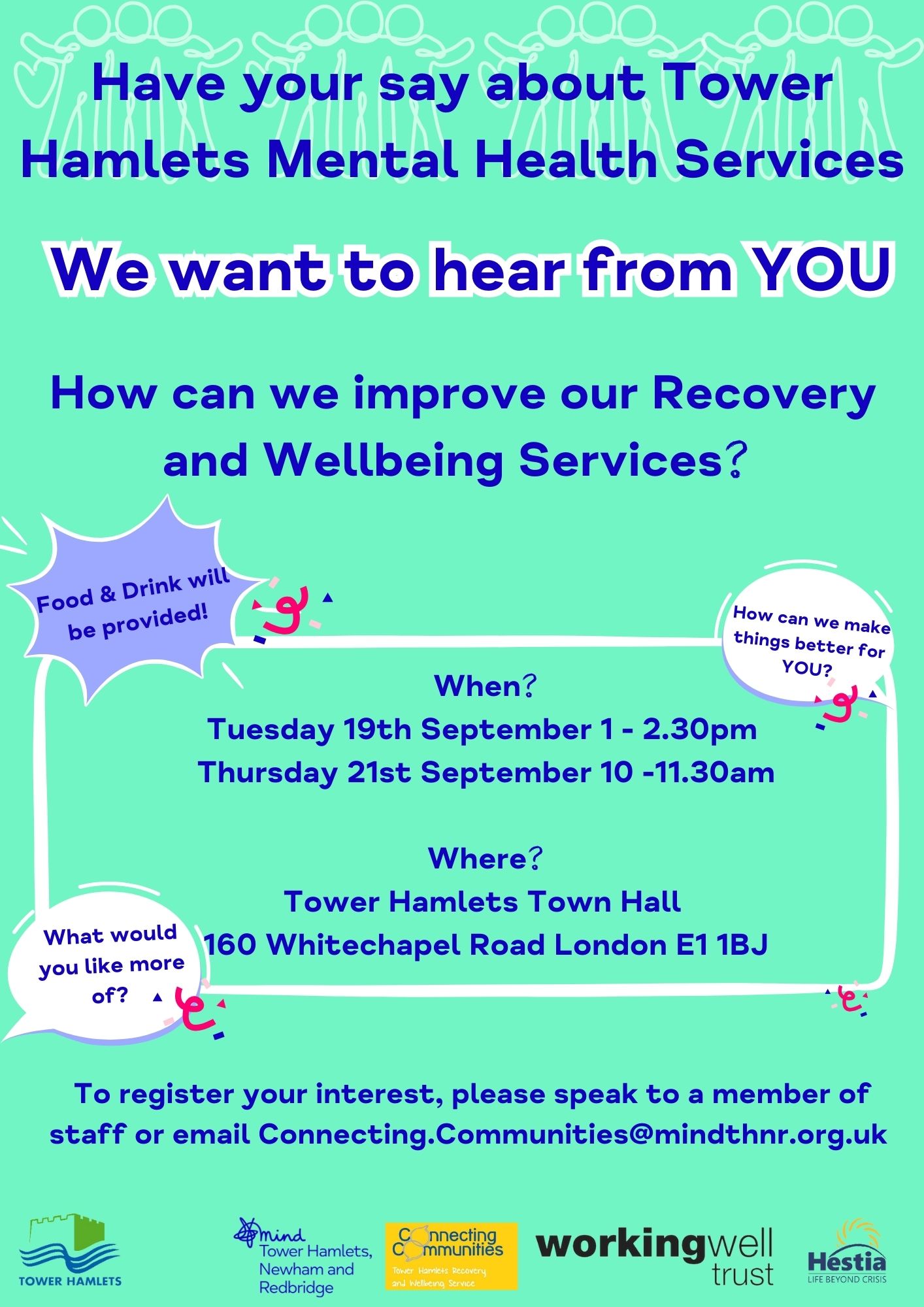
The Plan for the days -Tuesday 19th September – 1-2:30 and Thursday 21st September 10-11:30 is as follows:
- You can meet us at the Townhall (there will be someone there to welcome you) or at the Open House and we will travel together.
- On Tuesday we will meet at 11:30am at the Open House.
- On Thursday we will be at 9:30am at the Open House.
Please confirm any barriers to accessing that you may have, and we can discuss how to best support you. The Townhall is Wheelchair accessible.
Contact: Connecting.Communites@mindthnr.org.uk


We are inviting carers of people with COPD to take part in a research study called:
Identifying the best ways to deliver health care for people from ethnic minority groups living with chronic obstructive pulmonary disease (COPD) and other health conditions.
- Are you a care giving family member or friend to a person with a long-term lung condition (COPD) from an ethnic minority group?
- Have you been involved in a consultation using telephone, mobile phone, apps, video or website either with or on behalf of the person with COPD?
If yes to both questions, we would like to hear your views and experiences in a one-to-one interview.
We hope this study will help us to improve services for you to better support the person you care for with COPD & improve the experience of health care by remote delivery for people with COPD.
If you are interested in taking part in the study, please contact the study researcher:
|
Study researcher: Dr Ratna Sohanpal Contact details: Centre for Primary Care, Queen Mary University of London, 58 Turner Street, London, E1 2AB. ratna.sohanpal@nhs.net, 079 3929 6667 |
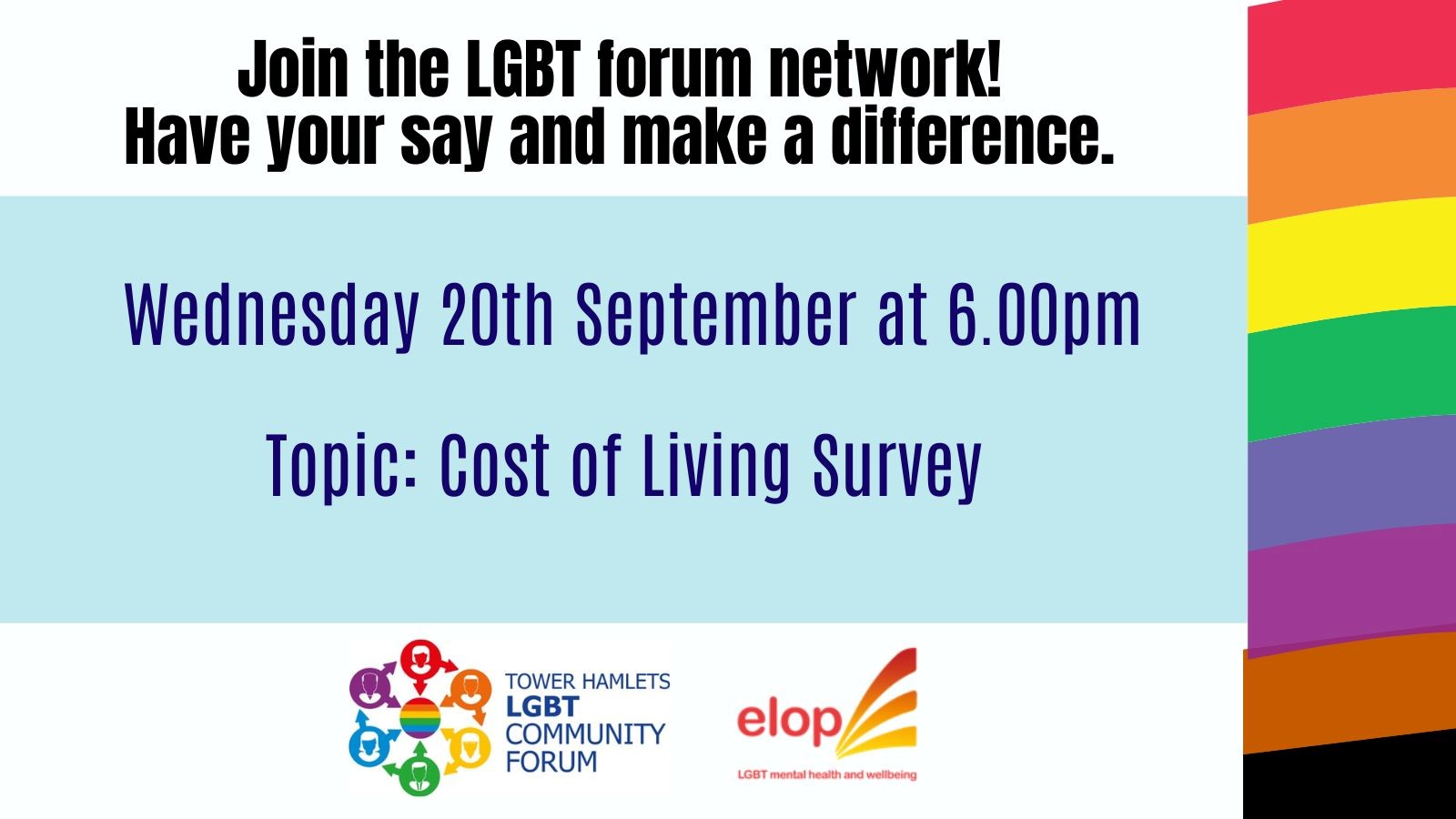
Join us our September Forum Meeting!
Wednesday 20th September
6 – 8pm
The Green House, 244-254 Cambridge Heath Rd, London E2 9DA
Ready to make your voice heard? Your insights matter to us!
The Tower Hamlets LGBT Community Forum is carrying out the “Tower Hamlets Residents Insights Survey on Cost of Living” throughout September. We are holding this Forum as an opportunity for you, residents of Tower Hamlets, to help us understand your experience on the cost of living in your community. Your valuable input will play a crucial role in helping us shape future services.
You’ll have the choice to complete the survey either anonymously or by providing your contact details.
If you provide your contact details you’ll be eligible for a £20 voucher which will be given once the survey deadline has closed.
Please email lgbtforum@elop.org to find out more
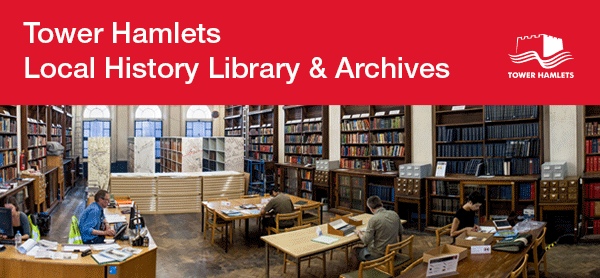
Events programme
We have a programme of exciting, free events lined up, which you can book now online. Details below! All events take place in person here at the archives unless otherwise mentioned, and you can book your free place on our Eventbrite.
East End History Club: Voices in the archive!
Nawab Ali: An Extraordinary LifeSaturday 16 September, 2-4pm This workshop will centre around a transcript from an oral history interview made by the writer Caroline Adams. The interview’s subject was a Bengali immigrant to the UK called Nawab Ali who arrived here in 1939, just before the start of World War II. His story is extraordinary and reflects the richness and hardships of the lives of immigrants to this country and the East End specifically. Participants will be invited to read sections of the text and edit together their favourite parts of Ali’s story for further discussion in an informal group setting. The workshop will begin with an introduction to Alastair Levy’s exhibited work My Home In Morgan Street (2023). Book your place here – Nawab Ali
How Writers Remembered the Jewish East End with Nadia ValmanThursday 28 September, 6-7.30pm – ONLINE EVENT! After World War II many East Enders permanently left the neighbourhoods where they had grown up. For Jews whose parents and grandparents had arrived in the East End in the Victorian period this also signified the end of the vibrant Jewish community life that had developed here in the first part of the twentieth century. In this online talk Professor Nadia Valman (QMUL) discusses how Jewish writers remembered their childhood in the East End of the 1930s. Book your place here – How writers remembered the Jewish East End Listening to the Jewish East End: A guided walkSunday 8 October, 11am-2.00pm Explore London’s Jewish East End with Professor Nadia Valman and Dr Vivi Lachs of Queen Mary, University of London, who present a free guided walk through East London’s Jewish past based on their Arts and Humanities Research Council project on English and Yiddish literature and song of the East End from the 1880s to the 1950s. *RESCHEDULED DATE* Book your place here – Guided Walk Re-sounding the East EndThursday 16 November, 6.30-8pm Join us for a discussion with curators and historians Nadia Valman, Tamsin Bookey, Rehana Ahmed and Alan Dein responding to the three sound art installations that form Everything is different, nothing has changed in the context of the East End’s social and public history. This event is part of the Being Human Festival. |

Mental health crisis support 24/7 via telephone 0800 073 0003 (all ages).
The Together Café for adults in Tower Hamlets who are at risk of developing a mental health crisis can drop into this service out of hours for professional support and group activities. Located at Osmani Trust, Osmani Centre 58 Underwood Road E1 5AW. Open Monday to Friday 5pm-9pm and Saturday to Sunday 12pm-9pm.
Safe Connections Hub: For people aged 18+ who are having thoughts of suicide. Self-referral by email safeconnections@mindthnr.org.uk or telephone 09:30-16:30 0300 561 0115. Flyer attached, which includes information about

Pause with a painting
Seascapes: Ebb and Flow


On the occasion of our Take One Picture exhibition inspired by a seascape, we will take time to pause in Room 31 and absorb the light and colours of Claude’s sunlit seascape.


EMERGENCY CARERS SERVICE
Getting the right and timely 1:1 support for the person you look after should you experience an emergency and / or you need urgent time out from your caring role is very important.
You may be eligible for emergency care for the person you care for – this service is called the Emergency Carers Service.
Carers Centre, Tower Hamlets is pleased to be working in partnership with Excelcare Homecare, the company that delivers this valuable emergency service for carers, in Tower Hamlets.
Criteria
The purpose of the Emergency Carers Service is to enable carers to attend appointments knowing that the person they care for is safe; to support carers who are experiencing a crisis.
The agreed criteria for self-referrals is as below:
- To allow a carer to attend medical appointments such as GP/Hospital.
- In the case that a carer has been admitted to hospital without notice.
- Sudden death of a carer.
- Carer experiencing a breakdown in mental health.
- There is a risk of harm to the carer/cared for person or a risk of domestic violence.
- Breakdown in relationship between the carer/cared for person, including that the carer feels unable to fulfil their responsibilities in their carer role.
- Carer experiencing an emotional breakdown.
- Potential safeguarding risks/concerns.
- Carer entering the criminal justice system.
- The service can only be provided in the case that the carer/cared for is not already in receipt of services through Adult Social Care. However, carers who are in receipt of a carers relief service and are at risk of significant crisis, can be provided with an additional 12 hours of flexible carers relief as a top up.
Support the Emergency Carers Service can offer
- The Emergency Carers Service is able to provide up to a maximum of 24 hours of support within a 12-week period. Where there is a longer-term need, or additional support is required within this period, this will be managed through a Carers Assessment and commissioned package of care. Excelcare Homecare and Carers Centre Tower Hamlets can you help if you need longer term care and support for the person you care for.
If a carer wants to self-refer to the Emergency Carers Service
- Staff at the Carers Centre Tower Hamlets are here to help you if you need this service, do call us if you need assistance. However, all carers can call and self-refer too, over the phone, by calling 020 7780 9484 or by emailing referralsth@excelcareholdings.com
- If you are making an urgent self-referral, to start on the same day, or outside of Monday – Friday 8.30am – 5pm, please ensure that you call and speak with a Care Coordinator at Excelcare Homecare, using the number above.
- For emergency self-referrals, a minimum of 2 hours-notice is required. Emergency self-referrals can be made 7 days per week, please aim to contact our service by 7pm if required to start that evening. If there is a very urgent self-referral that requires immediate start after 7pm, still refer this onto Excelcare Homecare for discussion and assistance.
- For non-urgent self-referrals, please provide 24 hours’ notice where possible.
All Excelcare Homecare team members have a good level of spoken and written English and undergo a nationally recognised Care Certificate that includes important areas such as First Aid, Medication, Safeguarding of Vulnerable Adults and Children, the Mental Capacity Act, Health and Safety, Fire Safety, and Infection Control. They also take part in a thorough induction which covers our policies, procedures, expectations, and period of shadowing an experienced carer.
To make sure a loved one is in good hands, Excelcare Homecare draws on a large number of care and support team members from different cultural backgrounds and then strives to match them appropriately with the people we care for. We also endeavour to keep carers as consistent as possible for families. We have a number of care workers who speak Bengali and are able to offer culturally appropriate care.
Excelcare Homecare understand how important it is that their team members have the right skills, personality, and attitude – giving you peace of mind that your loved one is cared for as if they were a member of our own family.
You can find more information about Excelcare Homecare here: www.excelcareholdings.com
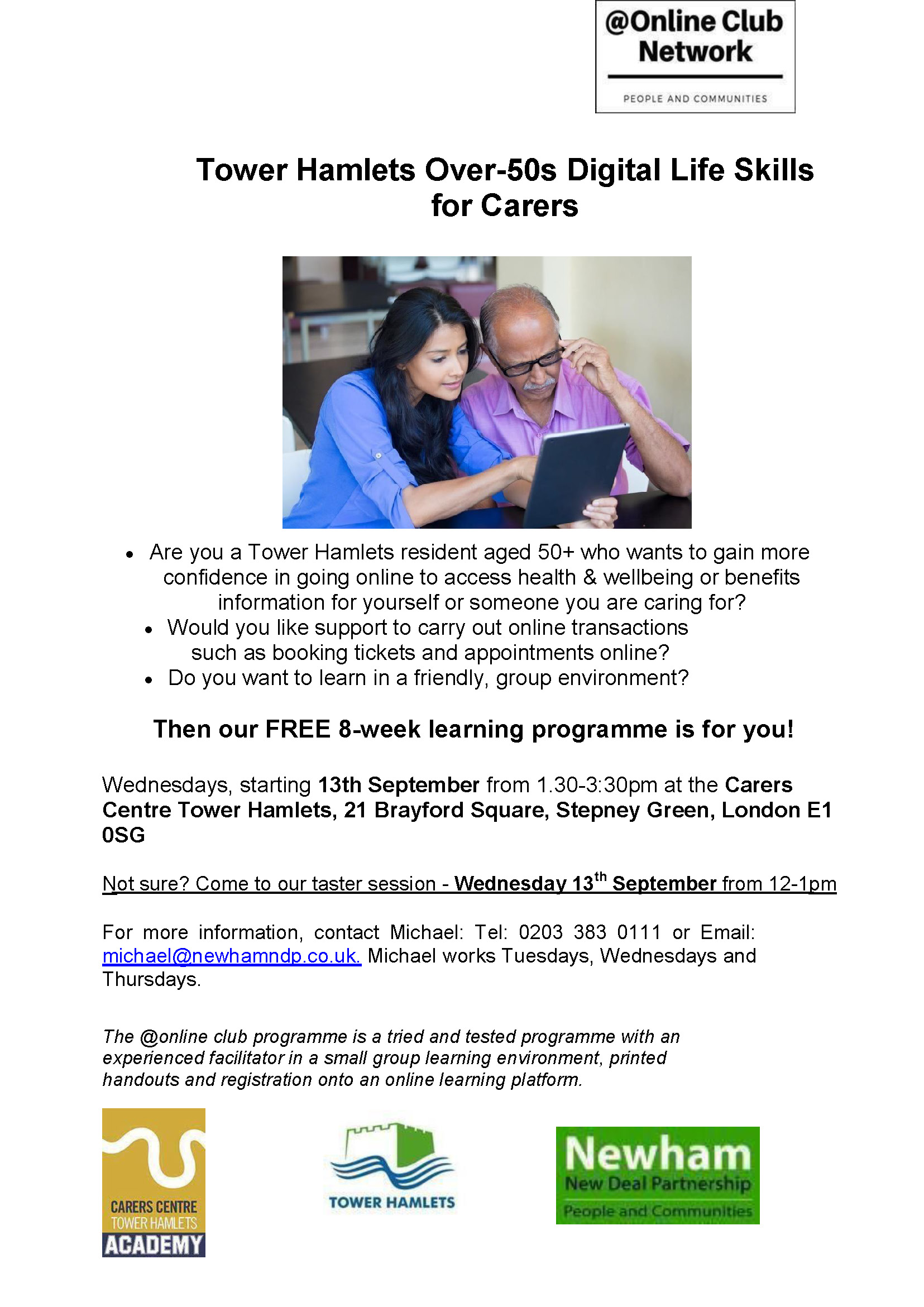

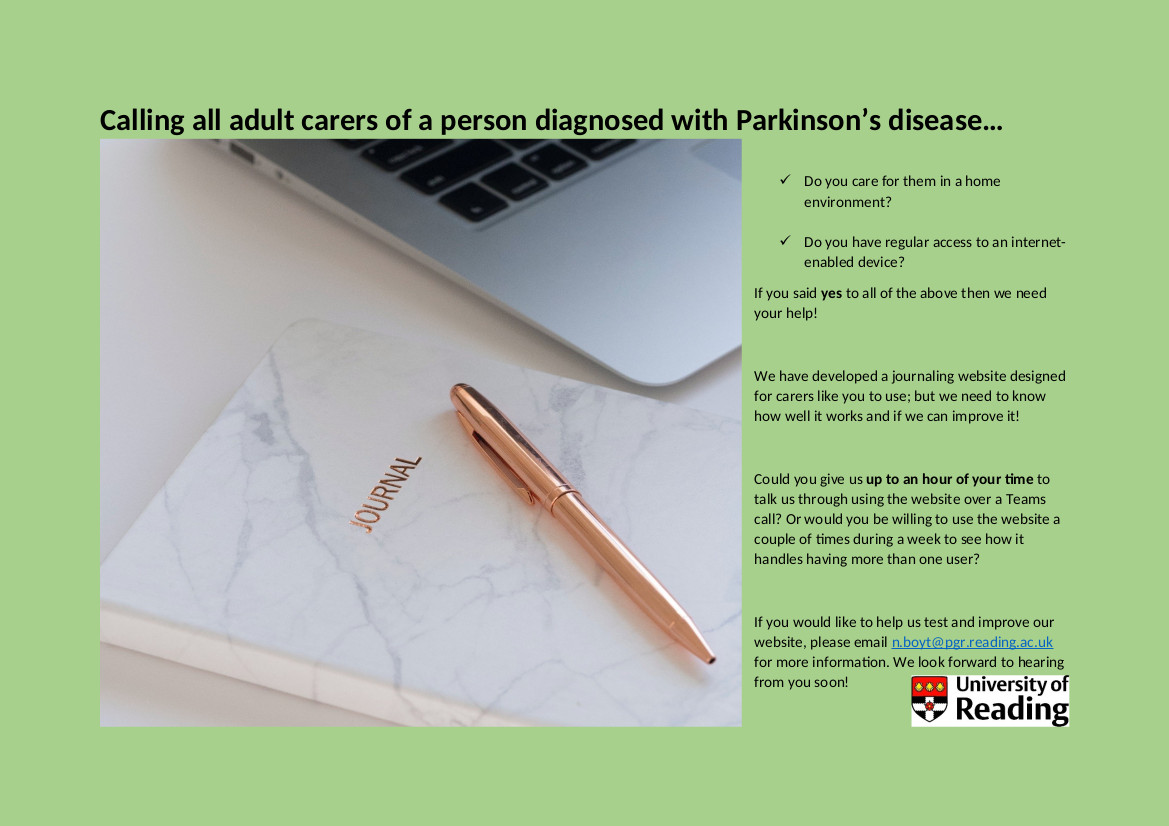


Carers of People with Dementia Peer Support Group
Wednesday 27th September @ 10am to 11am – Hybrid via zoom or in person
This monthly peer support group aims to help carers network, support each other, learn caring tips, and share knowledge, it is your group, and you have a say in how is runs.
Bengali Dementia Carers Group
Wednesday 27th September @ 11 to 1pm – at the Carers Centre
This new peer support group has been coproduced and developed with Bengali carers of loved ones with Dementia and will be a monthly group for carers to support each other, learn to manage their caring role, you will be able to bring the person you care for, and activities will include gardening and Islamic Art classes.
Dementia Carers Drop In
Wednesday 27th September @ 12pm to 1.30pm
We have a new drop in with an English-speaking worker also a Chinese speaking Admiral Nurse/Dementia specialist, but the drop in is for all carers of someone with Dementia so come along and you will be able to ask any questions about Dementia, resources, and local support services.
Don’t forget that if anything happens, use the numbers below and if it is an emergency dial 999.

Important Numbers:
Domestic Violence Duty Line: 020 7364 4986 between 9am – 5pm.Victim Support: 020 7364 2448/7957
Tower Hamlets Connect/Adult Social Care : 0300 303 6070


Help for Households Gives clear information about the exceptional payments, energy support and existing support schemes available, so the public know what is available and where they can find help. The homepage brings together over 40 support schemes that the public may be able to access depending on eligibility. Additionally, a range of online tools will help citizens quickly and efficiently check the support they might be eligible for and how to access it.


This is the link to find local councillors. You put you postcode in to find local councillor. They can deal with any housing issue if the carer/cared for is council tenant. They can also help if the carer lives in privately rented property and issue is disrepair.
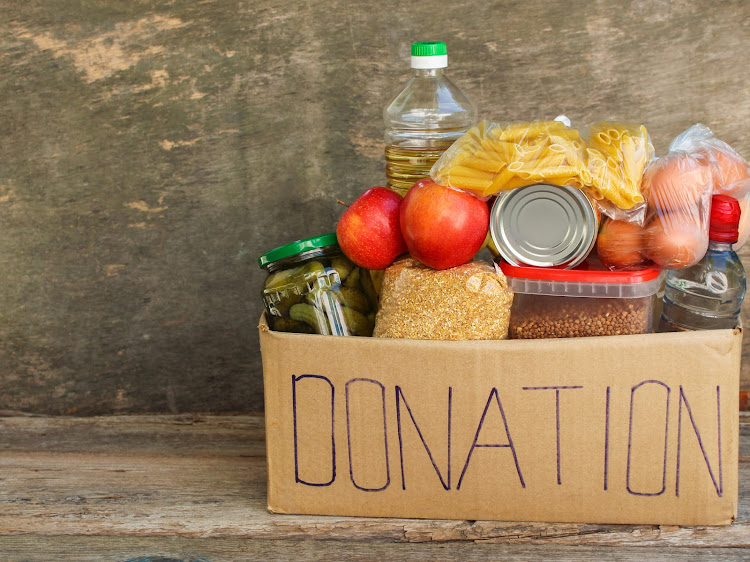

Food Banks Information
What you need to know
With the cost of living crisis affecting communities nationwide, the London Borough of Tower Hamlets have shared information on accessing your local FOOD Stores and tips on managing your food bills.
Tower Hamlets FOOD Stores
A number of FOOD stores have been set up across the borough, supporting those who are finding it difficult to afford enough food for themselves or their families.
At these FOOD stores, you are able to pick up food valued at £25-£35 in exchange for a £3.50 membership fee. At the same time, support is provided in other areas that you might need help with. This includes help with issues around
- housing
- benefits access
- employment and more.
To find out more or to become a member email thefoodstore@towerhamlets.gov.uk with your name, address, postcode, date of birth and contact number.
Foodbanks
There are a number of food aid organisations available to help you in Tower Hamlets if you are struggling to get food for yourself or your family. Scroll down to see where your closest branch is located. Different food aid services will offer different support.
Types
- Open Access – A food bank that anyone can go to for food.
- Limited Access/referral only – A Food bank that needs someone to refer you into the service. Please contact the organisation for more details.
- School food provision – A food bank or food aid service that specifically works with students and parents who attend the school.
- Hot meals service/Hostel – Provides hot meals or pre-made goods to residents.
Underwood Road Foodbank – (Open Access)
Opening times: Thursday and Friday, 9am – 3pm
St Anne’s Catholic Church, E1 5AW
Contact: 020 7247 7833 or email underwoodroad@rcdow.org.uk from Tuesday to Friday (9am – 3pm)
Ensign Youth Club – (Open Access)
Opening times: Friday 10am – 1pm
Wellclose Sq, E1 8HY
Contact: info@ensign.org.uk
Hague Primary School
Opening times: Monday – Friday 8.40am – 3.40pm
Hague primary school, E2 0BP and E1 5RE
For more information please ask at the school office.
Stewart Headlam Primary School
Opening times: Monday – Friday 8.40am – 3.40pm
Tapp St, London, E1 5RE
For more information please ask at the school office.
Wellington Primary School – Food bank (limited access/by referral only)
School food provision (Pupils and families only)
Opening times: Tuesday 2 – 3pm
Wellington Way, Bow, E3 4NE
Contact: admin@wellington.towerhamlets.sch.uk
St Elizabeth Pop Up Kitchen – School food provision (pupils and families only)
Opening times: 3.40 – 5pm
St Elizabeth Primary School, entrance on Waterloo Gardens, E2 9JY
For more information please visit St Elizabeth School website / Caritas Twitter page.
Bygrove School – School food provision (pupils and families only)
Opening times: Monday – Friday (Term Time Only)
Bygrove street, E14 6DN
For more information please visit the Bygrove School website.
Langdon Park School – School food provision (pupils and families only)
Opening times: Monday – Friday 8am – 4pm
Bright Street, London, E14 0RZ
For more information please ask at the school office.
Dorset Community Food Hub – (Open Access – Hot meals service)
Opening times: Thursday
Ground floor, former Dorset library, E2 8QX
For more information please visit the Dorset Community website.
Olga Primary School Foodbank – School food provision (pupils and families only)
Opening times: Friday 3.20 – 3.45pm
Olga Primary School, E3 5DN
Contact: 020 8981 7127
Edward Gibbons House – (Hostel)
Opening times: 24 hours
1 Parmiter St, E2 9NG
For more information please visit Providence Row website.
Globe Primary School – (Open Access)
Opening times: Friday 12 – 3.15pm
Globe Primary School, E2 0JH
For more information please visit Globe Primary School website.
Food for Aldgate – (Limited access/by referral only)
Opening times: Friday 1 – 3pm
Tonybee Hall, 28 Commercial Street, London, E1 6AB
Contact: Paul.wilson@eastendhomes.net or Twitter @FoodForAldgate.
Womens Inclusive Team – (Limited access/by referral only)
Opening times: Appointment provided after referral
Mayfield House 202 Cambridge Heath Road, E2 9LJ
Contact: 07415 372 664 or email shakilaa@wit.org.uk.
William Davis Food Bank – School food provision (pupils and families only)
Opening times: Friday 2 – 3pm
William Davis School, E2 6ET
Contact: 020 7739 1511
Bow Food Bank – (Open Access)
Opening times: Monday 8am – 12.30pm
Bromley by Bow Centre, St Leonard’s Street, E3 3BT
For more information please visit the Bow Food Bank website.
Bethnal Green Foodbank – (Open Access)
Opening times: Wednesday 2 – 7pm
Raines Foundations School, Approach road, E2 9LY
For more information please visit Bow Food Bank website.
Bow Muslim Cultural Centre – (Open Access)
Opening times: Friday 11am – 3pm
246 Bow Road London, E3 3AP
Contact: info@bowcentralmosque.co.uk
SACC Food Bank – (Limited access/by referral only)
Opening times: Thursday and Friday 10am – 3pm
St Anne’s Catholic Church, E1 5AW
Contact: braziliancp@rcdow.org.uk or 020 7247 7833.
Referrals can be discussed by email or contact number.


| Launch of Somali National Helpline 0800 6102020 |
Better Safe Communities are pleased to inform you of the launch of the first historic Somali National Helpline, sponsored by the local businesses up and down the country and in regards to poor service provisions of UK public services for Somali communities nationally.
The Helpline was founded by Khadra Hersi, a student of London Met University. It is aimed at the Somali community, helping with language barriers, immigration, and mental health issues due to war in their country. The Somali National Helpline are a service that uses professionals to support people overcome issues they are facing. They exist to support individuals with language matters, mental health issues, and beneficiaries to solve their problems. They also provide translating and interpreting services. They are here to support and advocate for many problems faced within the Somali community such as young adults suffering from knife crime, and elderly people who feel isolated and lonely due to language barriers.
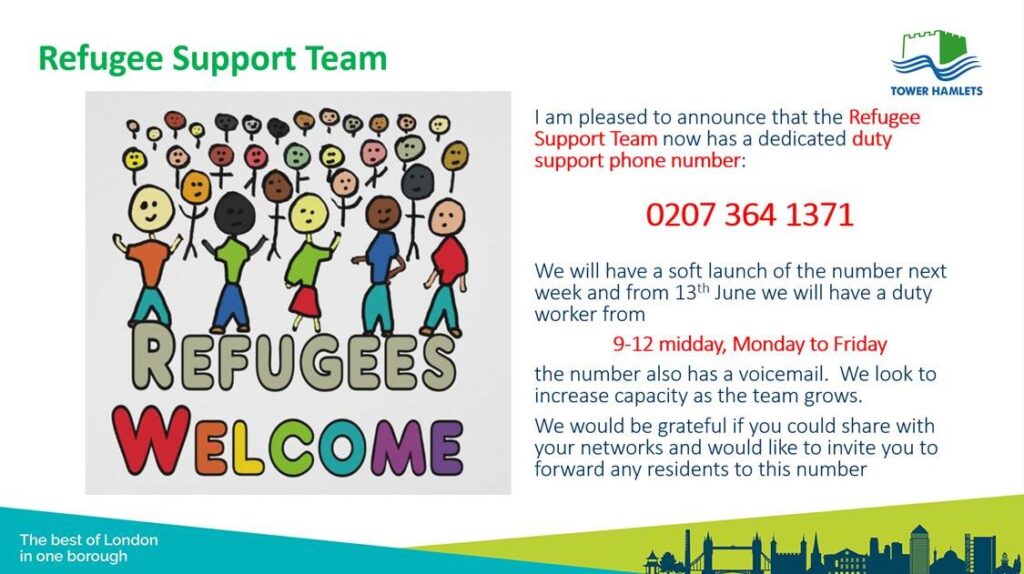


Why do you need a Lasting Power of Attorney?
Does the person you look after making their own decisions but want help managing their money? Maybe they can make their own decisions now but want an arrangement in case they can’t in the future. Without a Lasting Power of Attorney (LPA) your family may need to go to Court. This can cause lots of hassle, delay, and expense.
There are 2 types of Lasting Power of Attorney; finances & property matters and decisions about health and care.
Why should you do it now?
- 1 in 3 of us will suffer dementia
- Many of us will retain mental capacity, but will physically struggle to manage our affairs at some point in our life
- Being married or asking your chosen person to act for you is not enough – you need to legally give them the power to help you
- If you leave making your Power of Attorney until you need it, it will be too late.
Carers Centre Partners
The Carers Centre Tower Hamlets is pleased to work in partnership with respected Law firms to provide carers with affordable support with LPA.
Jones Whyte are a Glasgow based multi award winning Solicitor firm and the reigning Law Firm of the Year 2021
- They prepare thousands of Powers of Attorney every year
- Have partnerships with many major national charities
- They offer competitive Power of Attorney fees £349 + vat
Carers Centre staff can refer you, or you can contact them yourself on 0330 175 1234 or email appointments@joneswhyte.co.uk
You can find our more about Jones Whyte here Power of Attorney – Solicitors Glasgow | Jones Whyte Law
Duncan Lewis Solicitors – “We believe in access to justice for the most vulnerable in society and do everything we can to ensure legal advice and support is available for those who need it most”.
Duncan Lewis Solicitors are a national firm with offices locally.
- They prepare thousands of Powers of Attorney every year
- They are available for face-to-face appointments at their local office (1 Kingsland High Street, Dalston, Hackney, London, E8 2JS) or surgeries at the Carers Centre if requested
- They offer competitive Power of Attorney fees £350 + vat
Carers Centre staff can refer you, contact us on 0207 790 1765 or at enquiries@ccth.org.uk
You can find out more about Duncan Lewis here https://www.duncanlewis.co.uk
Most solicitor firms support with LPA and carers are under no obligation to use either firm listed above and are free to seek support from any firm they choose.
What is I do not want to pay for support with LPA?
We also provide workshops and information for those who want to set up an LPA themselves, many people set up LPA without legal support. You can check our Calendar or give us a call for updates on our latest workshops.
You can also see the information links below for information.
Different ways to manage someone’s affairs
Call us on 0207 790 1765 or email enquiries@ccth.org.uk to find out more about LPA.
A carers guide to home fire safety
A new video resource has been launched on the London Fire Brigade website to help carers learn how to keep people that receive care safe from fire.
Sadly, around one third of those here who die or are severely injured by fire are in receipt of some form of care or support. If you are a formal (domiciliary care worker, support worker or clinician) or informal carer (family member, friend or neighbour) and are caring for someone in their own home, this new resource will help you identify fire risks and show you what you can do to reduce them. There is also more information available on the website around fire safety and prevention.
Watch the video >
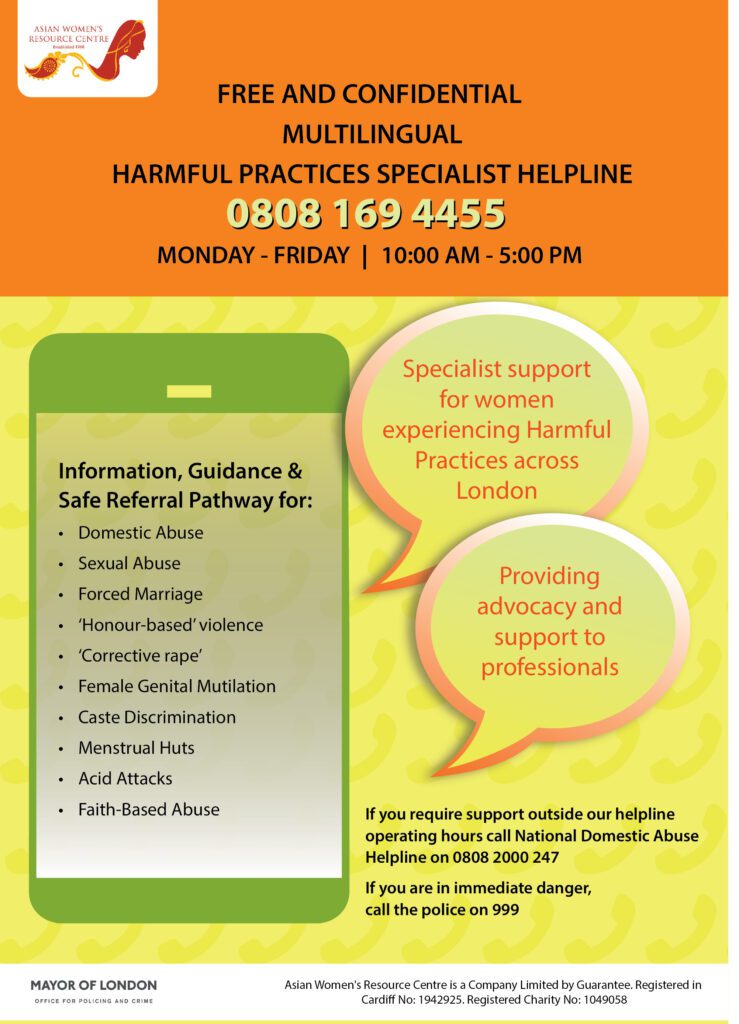

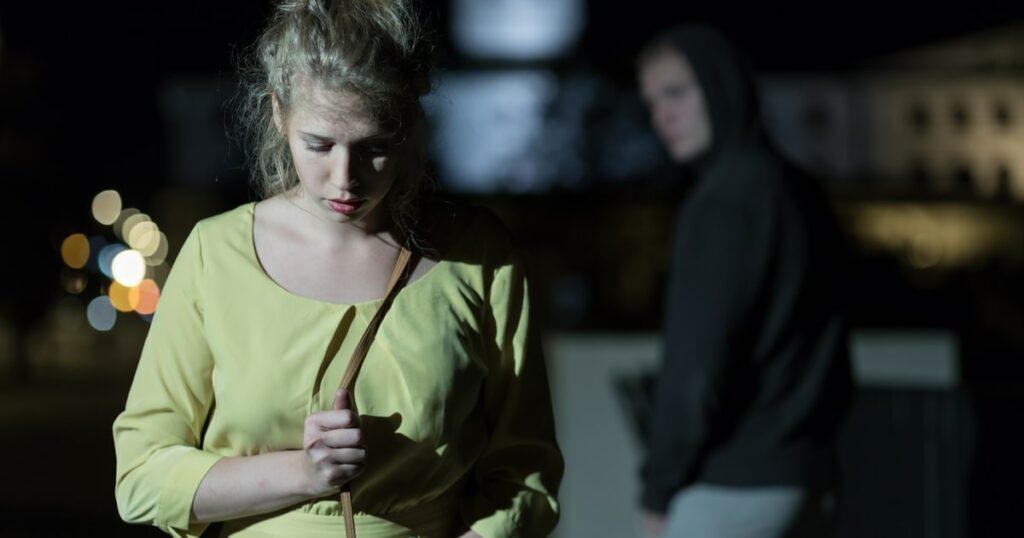

WALKING ALONE? REMEMBER THESE 10 TIPS
1) Plan Your Route
Make sure you plan your route ahead of time. If you are walking in an area you are not familiar with, this can help keep you from getting lost. You will be able to walk with confidence. If you do get lost, don’t wander aimlessly, find a gas station, supermarket, or fast-food restaurant where you can ask for directions.
2) Make Sure Someone Else Knows Your Plans
Don’t go out when it is dark without telling someone, even if you are just taking the dogs out for a walk around your neighbourhood or walking home from a friend’s house nearby. It may seem paranoid, but in fact, knowing someone knows where you are can be reassuring and help you feel safe. If you fall and hurt yourself or run into trouble, and someone knows where you are, they can send help if you don’t arrive at your destination on time.
3) Always Carry Your Phone with You
Always carry your phone, but not for music or to make social calls as your walk. Your phone can be a lifeline if you see something suspicious or worse if something happens to you. Download a safety app on your phone, so you’ll be able to discreetly alert the authorities if you feel threatened or see something suspicious.
4) Avoid Suspicious People and Areas
Areas that are dark, deserted, or out-of-the-way, such as an alley or a parking lot, can be riskier than a well-lit area full of people. Stick to busy, lighted paths, to minimize the risks. Also, walk mainly in familiar places where you are known. That way, if you feel like a suspicious person is following you, you can always duck into a store you know or knock on a neighbour’s door. Avoid empty streets and pathways with thick shrubbery.
5) Keep Your Hands Free
Except for a flashlight and one of the items discussed below, keep your hands free. If you are carrying anything, put it all in one bag or backpack. This will make it easier for you to react if you notice someone following you. In a dangerous situation, carrying too many bags can keep you from moving as quickly as you can if your hands are free or if you only have one bag.
6) Carry a Non-Violent Deterrent
In addition to a flashlight, A whistle will help you alert others and call them to aid you if something is wrong. The loud noise may put off attackers, and they’ll move on to find someone else. Mace or pepper spray can give you enough time to evade a potential attacker, and in a pinch, a flashlight can be used as a weapon. Make sure you know how to use the mace or pepper spray to get its full effect.
7) Wear Reflective Clothing to Prevent Accidents
When it comes to personal safety, it’s not just about suspicious people. Areas with low visibility can be prone to accidents. Reflective clothing allows bikers and cars to see you as you walk along. A flashlight or headlight can also help drivers see you if there are dark stretches of road on your route.
8) Take a Self-Defence Class
When fighting off something as an assault, the element of surprise can work in your favour. If you regularly walk alone, take a self-defence class. You don’t have to become a black belt. In fact, it’s probably better to learn something like Krav Maga, which has been popular for self-defence. The idea is to disable your attacker enough for you to get to safety, and a class focused on self-defence will help give you those survival skills.
9) Remove Any Distractions
Keep your phone in your hand in case you need to hit the panic button on your safety app, but don’t let it distract you. When walking alone at night for exercise, music can be motivating and energizing but also distracting. You may not hear someone driving or walking up behind you. Avoid wearing headphones or talking on your phone as you walk.
10) Trust Your Gut
When walking alone at night, trust your gut. If you feel like an area or situation may be dangerous, don’t wait around to find out. Stop and scan your surroundings if you think someone is following you. If you are being followed, walk as quickly as you can to a well-lit public place. You can wait until you feel safe, or call a friend, a taxi, or an Uber to help you get safely get home at night.
Following these personal safety tips will help keep you stay safe when walking alone. Always be aware of where you are and alert to suspicious activity.
Opening hours
Monday - Friday – 9.30am – 5pm
Saturday and Sunday – Closed
